- HOME
- Alumni News
- Activity Reports
- Anjana (14th program) has started her "We too..." campaign in Nepal - July 2013
Activity Reports
Anjana (14th program) has started her "We too..." campaign in Nepal - July 2013
Report from Nepal: July 2013
My days in Kathmandu (July 3-6)
I arrived back in Nepal on July 3 and stayed at my friend’s place for 4 nights. During my stay in Kathmandu, I visited the CIL Kathmandu. I also went to see Geeta’s newly built house, which had stairs leading to the entrance door. It prevented me and Geeta, both in a wheelchair, from entering the house without help from others. I had requested a slope instead of a staircase since before the house was constructed, but clearly my request was declined. I was sad to hear the story and see the house. I realized how hard I would have to work on changing the minds of people.
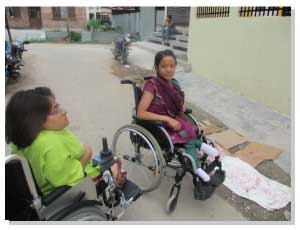 Geeta (right) and me (left) |
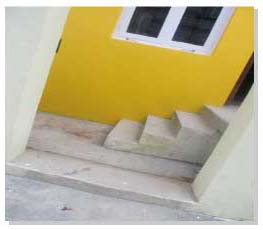 The staircase |
Going back home in Pokhara
I reached Pokhara on July 7. I stayed home for 5 days, during which I had no access to the Internet – very hard. But I had a good rest there.
On July 11, I moved to a town which location was more convenient. That’s where I am now, and I am planning different programs and looking for a house.
“We too…” campaign
On July 15, I talked about the “We too….” campaign at the ILS-Pokhara, Nepal (the organization I belong to). “We too” has a message that, “We, the disabled, want to do a lot of things just as you do. We want to study, go out, take a bus and go shopping. We want to do them because we too are humans. We too have human rights.”
On the following day, I had a meeting with my fellow workers, who warmly welcomed me back in Pokhara. Many of them said, “The current location of the office is no good. It’s too remote and inconvenient.”
Then we organized our first “We too” campaigning event, which took place on a special day on which Nepalese people paint their palms and bangles with henna. Some write down the name of a man/woman they are in love with on their palm. When washing their hand, it is believed, if the painting gets washed away completely then they will have heartbreak and if it gets muddy on the palm their love will come true. In general, disabled people tend to be too shy to talk about their love. Thus in our event, we all – people with and without disabilities, and people who are in love and who are not – drew a wheelchair on our palms. Underlying this event was our feelings that we disabled people want to join in having fun because we are humans, just like others.
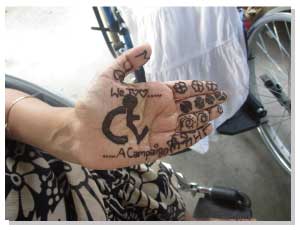
In that evening, my female colleagues and I stayed at one of our friends’ house. We discussed, “In our next event let’s involve our parents” – so that our parents would understand how we feel and support us in going active outside home. For this reason we thought that we should organize an event together with our parents.
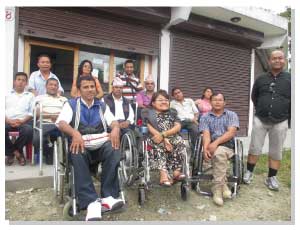 ILS-Nepal |
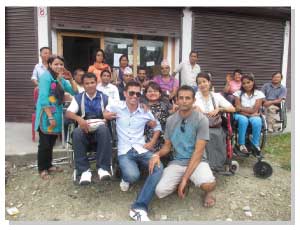 Joined by all the members |
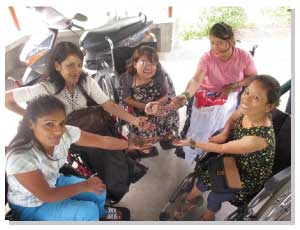
The first “We too…” campaign event
Other activities
On the 18th, I had a short meeting with people from the government. We discussed the ILS-Nepal’s activities, among others.
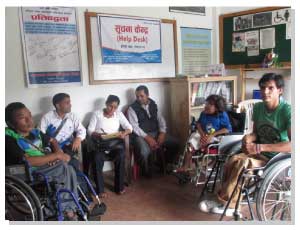
Our discussion with people from the government
On the 19th, I made a speech on disability, barrier-free and leadership at the leadership training program attended by students from various schools.
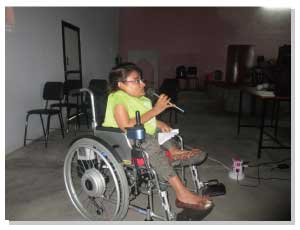
On the 20th, we had an opinion exchange session with school teachers. The theme was “disabled people and schooling/studying,” and we spoke about a number of issues including when schools would be able to accommodate students with disabilities and how they could study. While Rina shared her experience of having not been able to go to school, Manju talked about his life before and after he became disabled. And I spoke about the importance of developing systems as well as changing the minds of non-disabled people, and mentioned about the disability-friendly society in Japan. I also referred to the social model, which they said was a very useful concept to know.
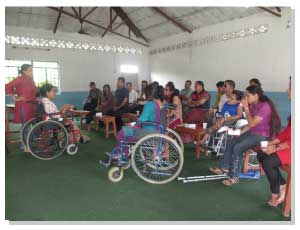 Rina giving a speech |
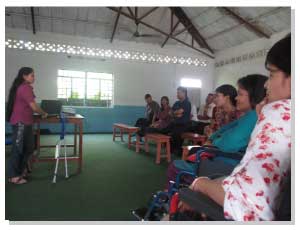 Manju talking to the audience |
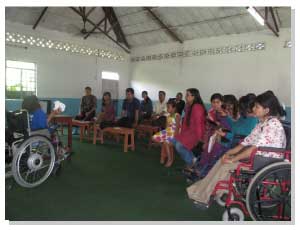
I introduced the social model
In the rest of the month, I went to look for a house in my wheelchair. I also went to a bar and smoked tobacco with my friends. That was my first time to try smoking, which was not considered to be a good thing in Nepal….he he. In addition, I spoke to my fellow Duskin trainees from the 14th program and people at TEKUTEKU on Skype.
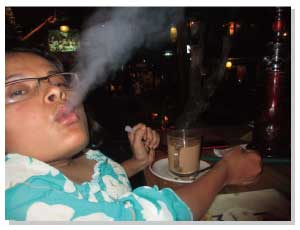
Me, the smoker … he he v(^o^)v
Lastly
I wish to find a nice accommodation and office as soon as possible. I have been searching hard because there are so many activities I want to start carrying out every day. Moreover, I have written an article on the “Wee too…” campaign and sent it to a publisher. Apparently, it is due to be published in a book in the near future.
Life in Nepal is hard. It is so hard, but I am happy, as I have my peers and we act together in our disability movement.
Dear my Japanese friends, please support us in changing Nepal!!
Missing you all…
Anjana KC
Former trainee (the 14th Duskin program)
Nepal




